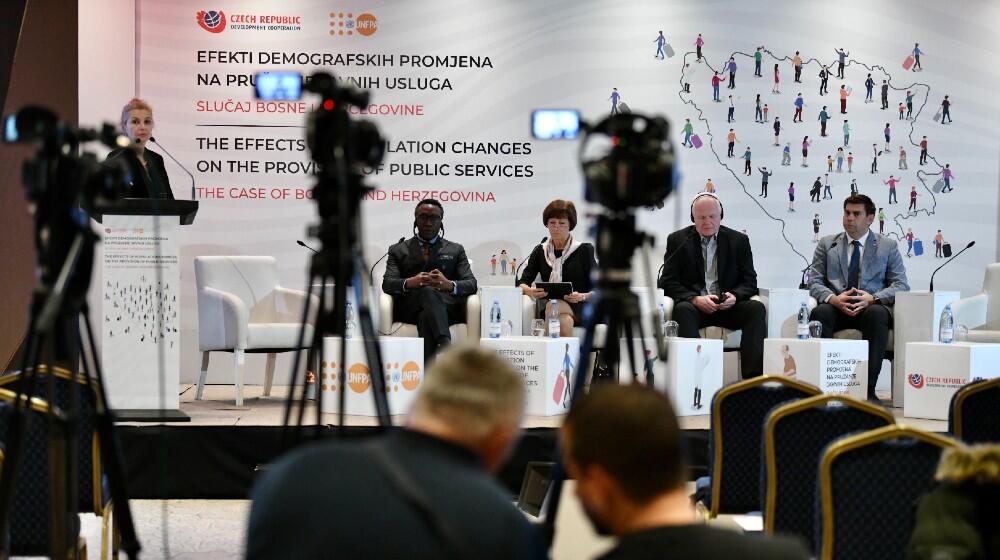Sarajevo, 10 November 2022 - A conference: “The Effects of Population Changes on the Provision of Public Services – The Case of Bosnia and Herzegovina” was organized today in Sarajevo by UNFPA, the United Nations Population Fund in cooperation with the Embassy of the Czech Republic in Bosnia and Herzegovina.
The Conference gathered government representatives, academia, civil society, the private sector, the United Nations, and other international multilateral institutions in Bosnia and Herzegovina, to discuss updated population projections for the country, as well as the effects of population changes on the provision/financing of public services in the education, health care and pension sectors in light of recently conducted demographic-economic analysis and the report presented at the Conference.
“It is common knowledge that Bosnia and Herzegovina is faced with real demographic challenges. However, a new UNFPA analysis presented today gives recommendations on how to tackle some of the very important challenges BiH is facing such as how to continue paying pensions or providing adequate health care in the event of doubling the number of older persons in the country, as well as negative natural change and emigration of skilled workers at a combined rate of at least 3% of the total population on annual basis. Furthermore, the question of the quality and size of the educational system was discussed given that in the last couple of decades the number of school-age children decreased by 30%. I am grateful to the Government of the Czech Republic for partnering with the UNFPA to conduct this important analysis and develop concrete steps for achieving demographic resilience of BiH”, said John Kennedy Mosoti, UNFPA Representative in BiH.
The authors of the report concluded that “population changes in BiH will have far-reaching consequences affecting every aspect of society’s life. To ensure the sustainability of the entire system of public services, governments need to work on strengthening human capital through developing modern skills in children, investing in research and development, and upscaling preventive health care services. Furthermore, in the labour market, it is necessary to develop adequate measures that would activate over half a million population that is currently neither looking for employment nor engaged in education. Given that women represent the majority of the inactive population, such measures largely need to take into consideration their needs from the provision of childcare and care services for adults to informal programmes aimed at their upskilling and reskilling and enabling an adequate balance between work and personal/family time. Finally, reforms of the tax system should be introduced to decrease the tax burden on employers and increase workers’ salaries and wages aimed at enabling formal employment and reducing the grey market.”
“Bosnia and Herzegovina is one of the six priority countries for the Development Cooperation programme of the Government of the Czech Republic. We are pleased that through our work, and strong partnerships, such as this one, we are supporting BiH in the process of EU accession. I truly believe that the importance of the analysis for achieving demographic resilience of BiH will be recognised in the broadest sense, and that proposed concrete steps to achieving it will be taken.” said Ivana Hlavsová, Ambassador of the Czech Republic to Bosnia and Herzegovina.
Note to the editors:
The Conference comes as a follow up to the Regional Conference “Population Dynamics, Human Capital and Sustainable Development in South-East Europe” held in Sarajevo in 2019 and the High-Level Regional Ministerial Conference “Pathways for Societies to Thrive in a World of Rapid Demographic Change” held in Sofia in 2021. Overall initiative comes as part of the Demographic Resilience Programme of UNFPA aimed at strengthening capacities of governments for adjusting to rapid demographic changes including low fertility, increased emigration of young, skilled workers and population ageing in Eastern Europe. Special focus of the initiative is to give answers to questions related to promoting the importance of gender equality and human capital in terms of its quality rather than quantifying population living in the country.
For more information please contact: Majda Smajlovic, prljaca@unfpa.org, +38761171673


